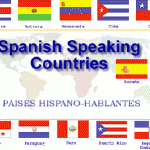The Strange and Beautiful Experiences of Language
The members of our Linguistics group have had several unique experiences with languages. There are multiple methods of learning another language, such as at home or in a classroom. Many of us took French or Spanish in high school as part of our curriculum.
Within our group, two of us have grown up with Spanish as our primary language. These native speakers have learned how to speak, write, and understand Spanish from being raised in a Spanish-speaking household. They continue to fluently converse in the language at home and with other native Spanish speakers. Bothhave traveled to her parents’ homeland or other Spanish speaking countries where they were able to practice speaking the different language as well. They were taught mainly at home and some got extra support by taking Spanish for native speakers classes in high school. Although they all speak Spanish and come from a Hispanic background, each of them have his or her own unique words and phrases that they were taught. One of our group members has Salvadorian roots, while the other two members are more familiar with the Mexican heritage.
A third group member grew up with parents and family who were native Spanish-speakers, but decided not to teach him the language. He took two years of Spanish in high school, resulting in an understanding of Spanish, but not fluency.
The other two members of our group learned French and Spanish in high school. Although they could not practice the languages at home, they became fluent in their respective languages. Both girls took proficiency tests before graduating high school (International Baccalaureate and Advanced Placement tests) and passed, proving their fluency.
The ability to speak Spanish as a primary language for one of our group members raised barriers in certain situations. She could only speak Spanish, making it challenging to communicate with English speakers. This lasted until she picked up English in elementary school, and she is now bilingual. The opposite problem occured for the non-Spanish speaking group member. At a family reunion in Puerto Rico, everyone in his family spoke Spanish. As the only person unable to speak the language, he had to rely on his parents for constant translation. The French-speaking member of our group grew up with a lisp, making it difficult for her to pronounce the English letter ‘s’.
The member of our group who learned Spanish high school has experience with many different languages despite not becoming fluent in them. As a child, her parents hired an au pair each year to watch her and her siblings while the parents went to work. If you do not know what an au pair is, it is basically a babysitter from another country who lives with a family for a year. She was cared for by young women from multiple countries including Germany, Mexico, Poland, and France. Although she did not learn the languages, the different types of speech were familiar to her.
We have each had our own unique experiences with languages throughout our life. Although most of us have learned the same language, we have lived it differently. For many of. us it is normal and routine because we have grown up with it. For others of us it is a special skill that we have acquired through hard work and persistence in a classroom setting.
Kaitlyn DeJesus
Laura Kalmanson
Paula Soto
Kim Gonzalez
John Rivera




 D5 Creation
D5 Creation
What are some of the major differences, do you think, between being natively bi- or multi-lingual and having to work at it?
-dsb